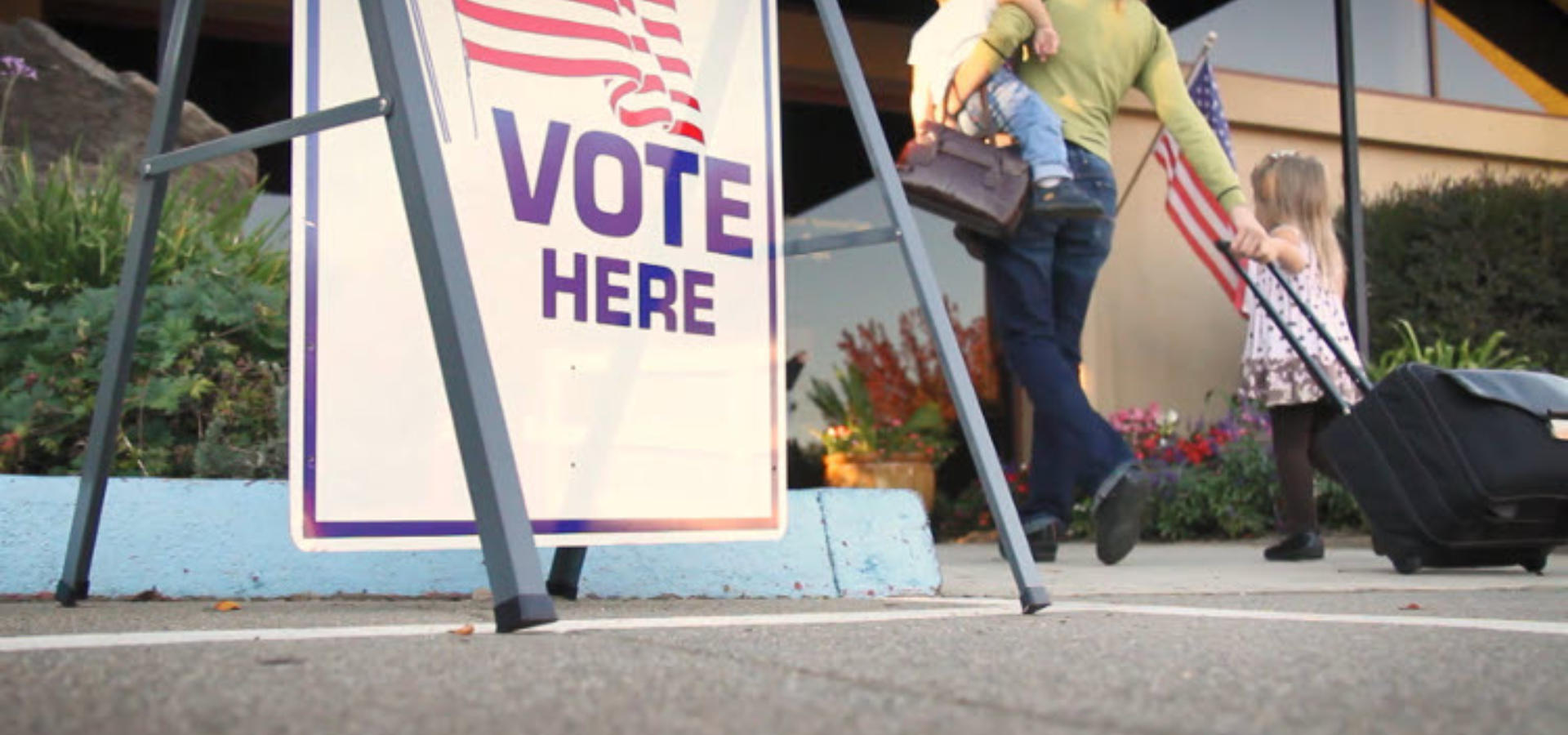
Virginians, are you ready to vote?
Critical elections are taking place on November 2nd. Early voting is already underway in Virginia and polls suggest the races are tight.
When God was leading the Israelites out of Egypt to the Promise Land, He established laws for them to operate within. He gave them 613 laws to be exact. 613 has always seemed like such a plethora of laws until discovering how many laws we issue every year in America and in our individual states.
It is our elected leaders that discern and vote on the public policies that become laws to govern our daily lives and our freedoms.
Our role is to elect good leaders who will make wise decisions, who can be found trustworthy in their daily actions, who will promote and vote for policies that will be good for all, not just provide gain for some.
Exodus 18:20-21 says, “Teach them his decrees and instructions and show them the way they are to live and how they are to behave. But select capable men from all the people—men who fear God, trustworthy men who hate dishonest gain—and appoint them as officials over thousands, hundreds, fifties, and tens.”
Knowing God and receiving His instruction on how we are to live, discern truth, and partake in daily life is important for each of us to do, but we must also consider our responsibility to elect good leaders who will be placed in authority over us.
‘Voting is a privilege’ and ‘elections have consequences.’ These are terms we have heard so many times that we easily brush them aside.
But gaining an understanding of the roles and responsibilities of the levels of government may make it easier to understand why our actions and decisions in voting today will determine the future of the Commonwealth of Virginia for our children tomorrow.
Here is what you need to know about the state government of the Commonwealth of Virginia. It consists of the Executive, Legislative, and Judicial branches of authority.
Virginia currently has a Democratic state government trifecta. A trifecta exists when one political party simultaneously holds the governor’s office and majorities in both state legislative chambers.
The Secretary of the Commonwealth’s office provides an organizational chart of Virginia’s State Government to assist you in understanding the state branches of government and their levels of authority. You can view the chart by clicking HERE.
Executive Branch
Governor
The Governor serves as the chief executive of the Commonwealth for a four-year term. As such, the governor is responsible for implementing state laws and overseeing the operation of the state executive branch.
Lieutenant Governor
“The official responsibilities of Virginia’s Lieutenant Governor are set forth in Article V of the Constitution of Virginia. According to the Constitution of Virginia, the Lieutenant Governor’s official duties are to serve as President of the Senate and preside over the Senate.”
“Should the Governor be unable to serve due to death, disqualification, or resignation, the Lieutenant Governor shall become Governor.” The Lieutenant Governor shall also serve as a member of several other state boards, commissions, and councils.
Attorney General
The Office of the Attorney General “provides legal services to the Commonwealth’s agencies, boards, commissions, colleges, and universities. They are the Commonwealth’s law firm, defending the interests of Virginians and Virginia government and also work with law enforcement throughout the Commonwealth to prepare for emerging public safety threats and to promote successful, secure communities.”
Legislative Branch
The Virginia General Assembly is the legislative body of the Commonwealth of Virginia. They enact laws, approve the budget, confirm the governor's appointments and elect judges and other public officials.
Senate of Virginia
“The Senate of Virginia consists of 40 members. Each Senator is elected from a separate and distinct district for a term of four years. All Senators' terms begin and end at the same time. Every four years the Senate reorganizes after the general election in which are elected. A Senator represents approximately 200,000 citizens of the Commonwealth. Each Senator receives an annual salary of $18,000.”
The Virginia House of Delegates
“The Virginia House of Delegates consists of 100 members. Each Delegate is elected from a separate and distinct district for a term of two years. All Delegates' terms begin and end at the same time. Every two years, the House reorganizes after the general election in which they are elected. As a result of the organization process, the House elects its leadership (Speaker of the House, Clerk, of the House, and Sergeant at Arms) and adopts the Rules of the House. As a result of the United States Census for the Virginia population, a Delegate represents approximately 80,000 citizens of the Commonwealth. Each Delegate receives an annual salary of $17,640.”
Judicial Branch
"The Supreme Court of Virginia is one of the oldest continuous judicial bodies in the United States. Its roots are deep in the English legal system, dating to the early seventeenth century as part of the Charter of 1606 under which Jamestown, the first permanent English settlement in North America, was established. In 1623, the Virginia House of Burgesses created a five-man appellate court which met quarterly to hear appeals from the lower courts. At the close of the Revolutionary War, the court system was reorganized.
Today, the system includes four levels of courts: the Supreme Court, the Court of Appeals, the Circuit Courts, and the District Courts. In addition, magistrates serve as judicial officers with authority to issue various types of processes. In Juvenile & Domestic Relations (J & DR) District Courts, intake officers serve as officers of the court with authority set forth in Virginia law.
There are 32 judicial districts in Virginia and every city and county in Virginia has a General District Court and a J & DR District Court." You can view the Virginia judicial chart here.
How does someone become a judge in Virginia?
"The judges of Virginia’s District Courts are elected by a majority vote of each chamber of the General Assembly for terms of six years. Vacancies in District Court judgeships occurring when the General Assembly is not in session are temporarily filled by the Circuit Court judges of the corresponding circuit until the General Assembly is back in session.
The judges of Virginia’s Circuit Courts are elected by a majority vote of both chambers of the General Assembly for terms of eight years. The governor makes interim appointments when the General Assembly is not in session, but these appointments are subject to confirmation by the General Assembly at the next regular session.
The 11 Court of Appeals judges are elected and receive interim appointments in the same manner as the Circuit Court judges. They serve a term of eight years. The chief judge is elected by a vote of the 11 judges for a term of four years.
The Supreme Court of Virginia is composed of seven justices elected by a majority vote of each chamber of the General Assembly for a term of 12 years. Interim appointments are made by the governor subject to confirmation by the General Assembly at the next regular session. As prescribed by law, the Chief Justice is chosen by the majority vote of the seven justices."
As Americans, we are allowed the unique opportunity to influence our laws. For Christians, this means we must bring our biblical worldview to the voting booth. Leading up to the November 2nd elections, Virginians, it's important to pray unceasingly, think biblically about the issues and candidates and make the effort to vote. Not only will these elections impact how you are governed in Virginia, but they will set the stage for the 2022 midterms that impact the entire nation.
To view election information and a voter guide for the Virginia elections, click here.
###
My Faith Votes— is a ministry that motivates, equips, and activates Christians in America to vote in every election, transforming our communities and influencing our nation with biblical truth. An estimated 25 million Christians who are registered to vote, fail to vote in presidential elections. My Faith Votes is on a mission to change this statistic by helping Christians act on their faith and vote in every election. When we pray unceasingly for our nation, think biblically about the issues, and vote consistently in every election the impact of Christians taking action from the local to the state and federal level will be unprecedented.
Website | www.myfaithvotes.org Twitter | @MyFaithVotes Facebook | My Faith Votes
